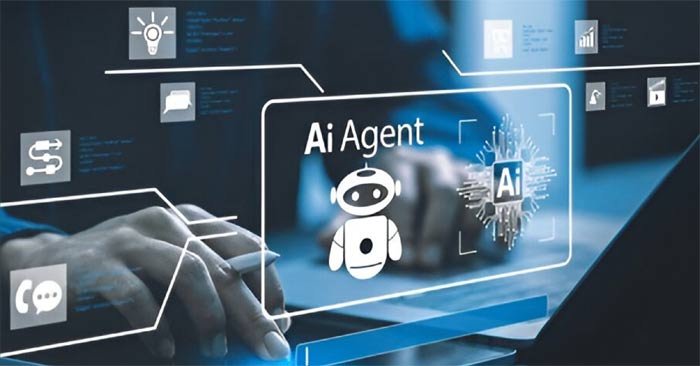Applications of AI Agent in business fields
Let's learn about real-world applications of AI Agents by exploring examples from healthcare, finance, sales, etc.

Enterprises are increasingly turning to AI Agents due to the rise of multi-agent systems, advanced automation, and the need for real-time insights. Since AI Agents can boost productivity in businesses of all sizes, they are well-suited for both startups looking for agility and large enterprises looking to scale efficiently.
The article will analyze the advantages & challenges of using AI Agent by industry in many fields such as finance, healthcare, education, etc.
AI Agent in Finance
AI Agent has many useful applications in the financial sector, such as:
- Fraud Detection Agent
- Automated trading bot
- Customer Integration Assistant
Fraud detection is a major challenge for banks, as traditional systems often struggle to keep up with the speed and sophistication of modern cybercrime. AI agents solve this problem by continuously monitoring transactions, learning customer behavior, and flagging anomalies in real time, allowing for faster and more accurate identification of suspicious activity.
In financial markets, risk management and rapid trade execution are critical, but human traders can be limited by speed and data processing capabilities. Automated trading bots powered by AI agents aim to solve this problem by analyzing market data, executing trades automatically, and adjusting risk controls in real time based on changing conditions.
If you've recently had to open a financial account, you may know that customer onboarding and KYC (Know Your Customer) compliance is often slow and error-prone due to manual document checks and risk assessments. AI agents can improve this process by instantly verifying documents, assessing customer risk profiles, and automating regulatory checks while maintaining a high level of accuracy.
Advantage
- Increase speed and efficiency
- Improve regulatory compliance
Disadvantages
- Lack of transparency
- Security risks
AI Agent in Healthcare
Advances in AI agents offer promising prospects for many healthcare applications, including:
- Schedule an appointment and triage symptoms
- Support diagnosis by summarizing EHR data
- Multi-agent systems for hospital logistics
Healthcare providers struggle with inefficient appointment scheduling and initial patient assessments, leading to administrative burdens and delayed care. AI Agents solve this problem by automating appointment scheduling, collecting patient information, and performing initial symptom triage through a conversational interface that guides patients and routes them to the appropriate level of care.
Clinicians face information overload when analyzing patient data, making it difficult to identify patterns, abnormalities, or make timely diagnostic decisions. Diagnostic AI agents address this challenge by analyzing large amounts of electronic health records, medical images, and test results to identify patterns, flag abnormalities, and provide decision support to healthcare providers.
To give you a real-world example: Ada Health's symptom checker, used by millions globally, uses natural language processing and medical logic trees to assess over 30,000 medical conditions and route users to telemedicine or emergency care based on urgency.
Hospital logistics and resource management are also complex challenges that involve coordination across multiple departments. To address inefficiencies in equipment utilization and staff allocation, multi-agent systems create specialized AI Agent networks that track assets, predict maintenance needs, and optimize resource allocation across hospital facilities.
Advantage
- Personalized healthcare
- Respond faster
- Improve results
- Reasonable operation
- Appropriate treatment decisions
Disadvantages
- Data privacy risks
- Suggestion-oriented
- Low reliability
- Need to be managed
AI Agent in Customer Service
Use cases include:
- Customer Engagement
- Multi-agent coordination
- Emotional Recognition Agent
Traditional support, the first line of customer service for basic inquiries, is often plagued by inefficient manual processes that lead to delayed responses and frustrated customers. AI chat agents solve this problem by automating routine inquiries, categorizing issues, and intelligently only forwarding complex cases that require human intervention.
Businesses face challenges when customers have different needs that require different expertise, creating bottlenecks and inefficiencies in the support process. Multi-agent orchestration solves this problem by creating specialized AI agents that handle specific domains such as billing or technical support, with efficient handoffs between agents when a query crosses expertise boundaries.
Finding the right tone is key when dealing with customers, but customer service teams often struggle to manage emotionally charged interactions that can damage customer relationships and lead to lost business. Emotion-aware agents solve this problem by analyzing customer tone and language in real time, automatically adjusting their communication style or activating 'de-escalation' techniques when frustration or anger is detected.
Advantage
- Reduce waiting time
- Available 24/7
- Consistent, continuous service
Disadvantages
- Integration challenges
- API restrictions
- Data synchronization

AI Agent in Education
Some practical applications:
- Personalized tutor agents
- AI Classroom Assistant
- Language learning agents for real-time conversation
Traditional education struggles to accommodate different learning styles and speeds, leading to gaps in understanding and student distraction. The personalized tutor AI Agent solves this problem by continuously analyzing student performance data and dynamically adjusting content difficulty, learning paths, and teaching methods to match individual learning styles and address knowledge gaps in real time.
Teachers face overwhelming workloads with lesson planning, content creation, and grading, leaving little time for meaningful interaction with students. AI classroom assistants address this challenge by automating administrative tasks, creating customized lesson plans, creating assessments, and providing objective scores with detailed feedback, freeing educators to focus on providing direct support to students.
Limited practice opportunities, inconsistent feedback, and anxiety about making mistakes are the big enemies of any language learner, hindering their progress and confidence. Language learning agents address these challenges by providing 24/7 access to conversational practice with human-like AI that adapts to the learner's level, provides instant correction, and creates a stress-free environment where mistakes become learning opportunities.
Advantage
- Personalize learning
- Real-time feedback
- Extended Education
Disadvantages
- Over-reliance on AI
- Limit critical thinking
- Reduced motivation

AI in logistics and supply chain
In logistics, it's all about efficiency. Use cases for AI agents include:
- Dynamic route optimization agents
- Inventory Coordinator
- Agents negotiating with suppliers
Traditional route planning methods typically attempt to find the shortest or fastest route. They often do not adjust to changing conditions, causing delays when unexpected obstacles such as traffic jams or road closures arise. AI route optimization agents solve this static route problem by continuously analyzing real-time data from sources such as GPS, traffic databases, and weather forecasts. They then dynamically recalibrate routes with new information to avoid congestion and optimize delivery routes.
Businesses face significant challenges in maintaining optimal inventory levels across multiple locations, resulting in out-of-stocks or excess inventory that clogs up capital and warehouse space. AI inventory management agents solve this problem by analyzing large amounts of data – including sales history, market trends, and even weather patterns – to predict future demand with unprecedented accuracy, then automatically adjust inventory levels and trigger reorders across the warehouse network.
Procurement teams struggle with inefficient, time-consuming, inconsistent negotiation processes and often miss out on cost savings due to limited data analytics capabilities. AI Negotiation Agent transforms this process by automatically evaluating supplier bids using historical data such as past offers, discounts, and external macroeconomic indicators, then creating a robust and direct negotiation strategy with suppliers to secure optimal terms.
Advantage
- Improve efficiency
- Reduce costs
- Increase sustainability
Disadvantages
- Difficult to combine
- Constantly having to adapt to disruption
- Ethical issues can arise easily.